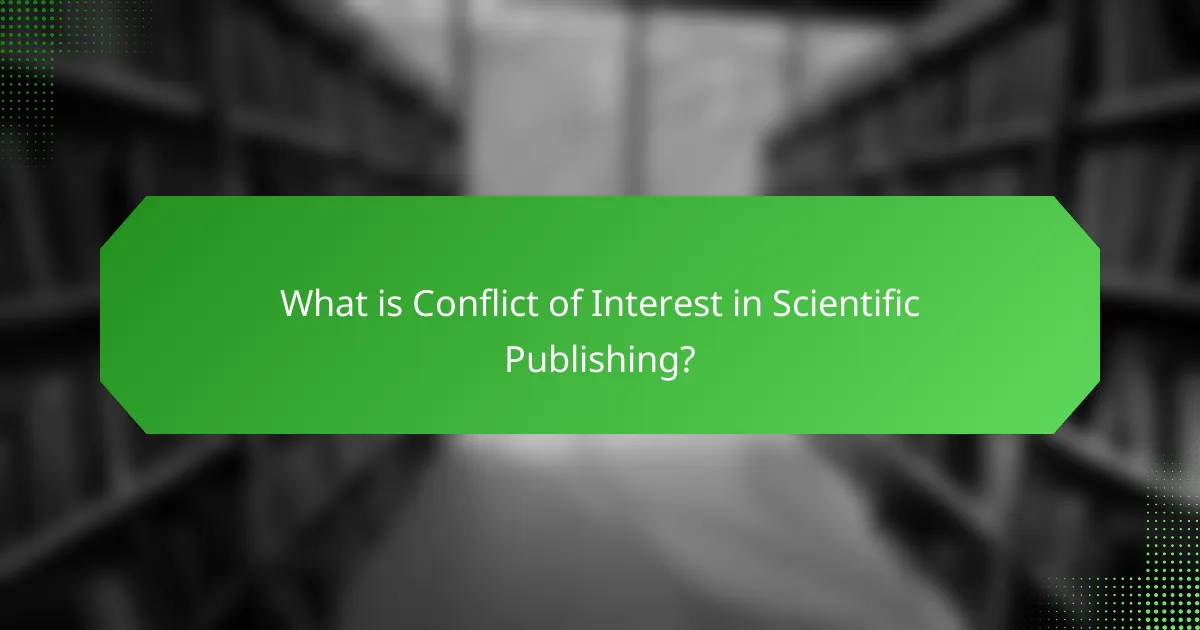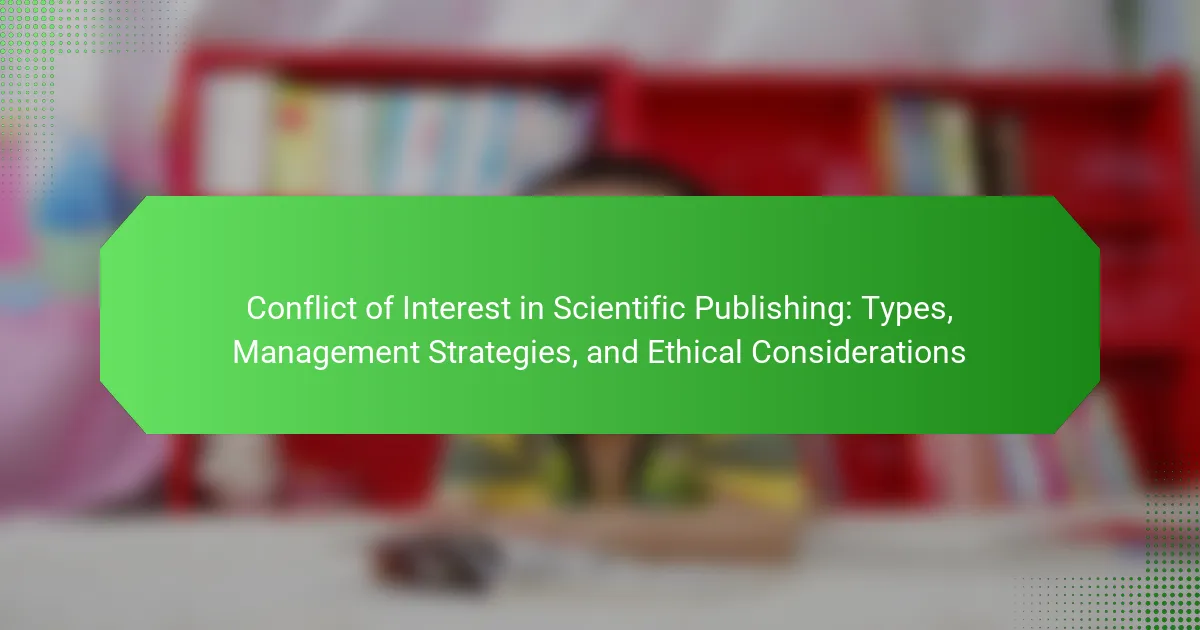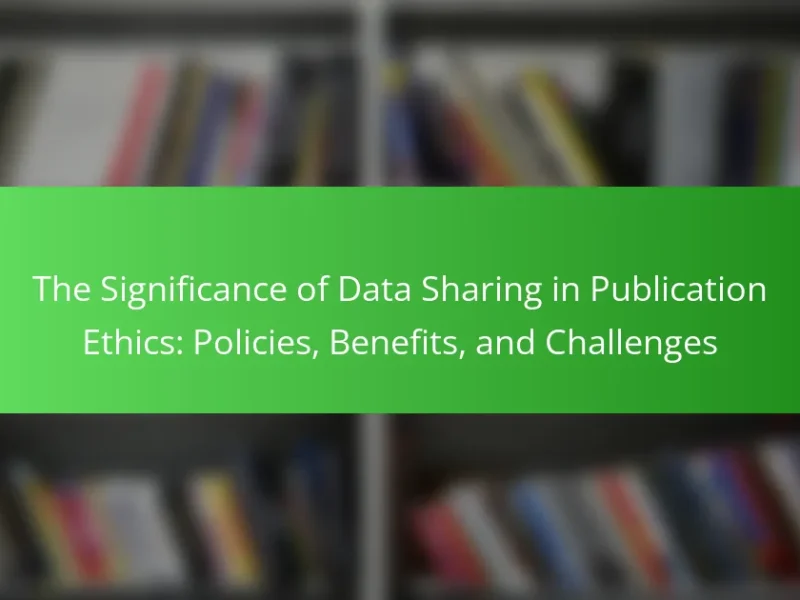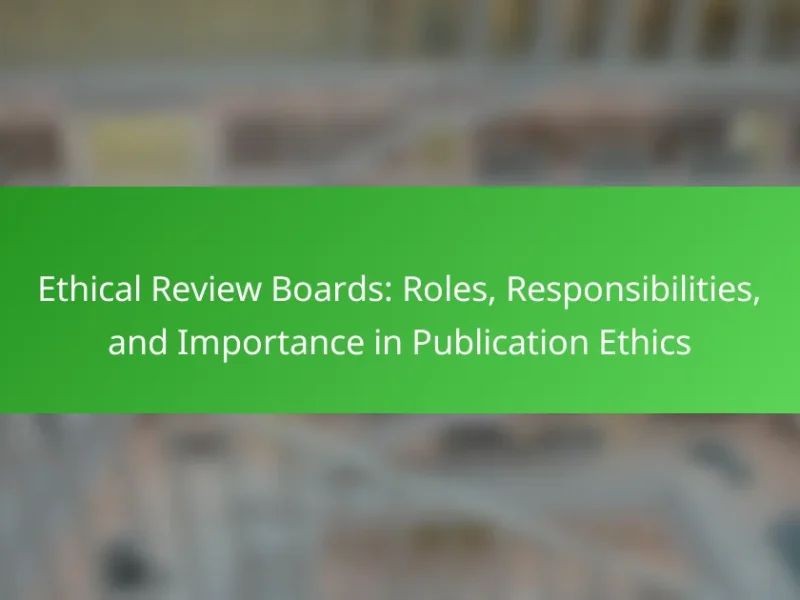Conflict of interest in scientific publishing refers to situations where personal or financial interests may compromise the integrity of research outcomes. This article examines the types of conflicts that can arise, such as those stemming from funding sources, affiliations, and personal biases, and how these conflicts can influence research processes and publication decisions. It highlights the importance of transparency in disclosing potential conflicts to uphold ethical standards in publishing. Additionally, the article discusses various management strategies to address conflicts of interest, ensuring accountability and maintaining public trust in scientific literature.

What is Conflict of Interest in Scientific Publishing?
Conflict of interest in scientific publishing occurs when personal or financial interests may compromise the integrity of research. These interests can influence the research process, results, or publication decisions. Conflicts can arise from relationships with funding sources, affiliations, or personal biases. For example, a researcher funded by a pharmaceutical company may favor results that support the company’s products. This can lead to biased conclusions and undermine public trust in scientific literature. Transparency about conflicts is essential for maintaining ethical standards in publishing. Journals often require authors to disclose potential conflicts to ensure accountability.
Why is understanding Conflict of Interest important in scientific research?
Understanding Conflict of Interest is crucial in scientific research because it ensures the integrity of the research process. Conflicts of interest can lead to biased results, which undermine public trust in scientific findings. They may arise when researchers have financial, personal, or professional ties that could influence their work. For instance, studies have shown that research funded by corporations may present results favoring the sponsor’s interests. The American Medical Association emphasizes the need for transparency to mitigate these risks. Properly managing conflicts of interest promotes ethical standards and fosters credibility in scientific publications.
What are the potential consequences of ignoring Conflict of Interest?
Ignoring Conflict of Interest can lead to significant ethical breaches in scientific publishing. It may result in biased research outcomes, undermining the integrity of the scientific process. Such bias can mislead other researchers and the public, affecting trust in scientific findings. Furthermore, it can lead to retractions of published papers, damaging the reputations of authors and journals. Legal repercussions may also arise, including lawsuits or loss of funding. According to a study published in the Journal of Medical Ethics, 30% of researchers admitted to having conflicts that could influence their work, highlighting the prevalence of this issue.
How does Conflict of Interest impact the integrity of scientific publishing?
Conflict of Interest undermines the integrity of scientific publishing by introducing bias in research outcomes. When researchers have financial or personal stakes in the results, objectivity can be compromised. This may lead to selective reporting of data that favors the entity involved. A study by the Institute of Medicine found that 70% of clinical trials sponsored by industry had outcomes favorable to the sponsor. Additionally, undisclosed conflicts can erode public trust in scientific literature. The presence of conflicts can distort peer review processes, affecting the quality of published research. Ultimately, transparency in disclosing conflicts is essential for maintaining the credibility of scientific work.
What are the common types of Conflict of Interest in scientific publishing?
Common types of Conflict of Interest in scientific publishing include financial conflicts, personal relationships, and academic biases. Financial conflicts arise when authors have monetary interests in the results of their research. Personal relationships can influence the objectivity of a study, especially if authors have close ties to organizations or individuals involved. Academic biases occur when researchers have a vested interest in promoting specific theories or findings. Each of these conflicts can compromise the integrity of the research and its publication.
What are financial conflicts of interest?
Financial conflicts of interest occur when an individual’s financial interests may compromise their judgment or actions. These conflicts can arise in various contexts, including scientific research and publishing. For example, a researcher may have a financial stake in a company that could benefit from their study’s outcomes. This situation can lead to biased results or influence the integrity of the research. Evidence shows that financial conflicts can affect the credibility of published findings. Transparency about these conflicts is crucial for maintaining trust in scientific literature.
How do personal relationships contribute to Conflict of Interest?
Personal relationships can significantly contribute to conflict of interest by influencing decision-making processes. When individuals have close personal ties, their judgment may be compromised. This can lead to biased evaluations or favoritism in professional settings. For instance, a researcher may favor a colleague for a grant due to friendship rather than merit. Studies show that personal connections often cloud objectivity, resulting in ethical dilemmas. The proximity of personal relationships can create perceived or actual conflicts that undermine trust in scientific integrity.
What role do institutional affiliations play in Conflict of Interest?
Institutional affiliations significantly influence Conflict of Interest (COI) in scientific publishing. These affiliations can create perceived biases due to financial or research interests associated with the institution. Researchers may face pressure to align their findings with institutional goals or funding sources. This can lead to conflicts between personal ethics and institutional expectations. Studies show that COI disclosures often correlate with the nature of the researcher’s affiliation. For example, researchers affiliated with pharmaceutical companies may have a higher likelihood of reporting favorable outcomes for those companies. Therefore, understanding the role of institutional affiliations is crucial for transparency and integrity in research.
How can Conflict of Interest be managed in scientific publishing?
Conflict of Interest in scientific publishing can be managed through transparency and disclosure. Authors should declare any potential conflicts when submitting manuscripts. Journals often require detailed conflict of interest statements from authors and reviewers. Peer review processes can include independent reviewers to minimize bias. Editorial boards should have clear policies on handling conflicts. Training on ethical standards can help researchers recognize and manage conflicts. Regular audits of compliance with conflict of interest policies can ensure adherence. These strategies promote integrity and trust in scientific research.
What are the best practices for disclosing Conflict of Interest?
Best practices for disclosing Conflict of Interest include transparency, clarity, and timeliness. Authors should clearly state any financial or personal relationships that could influence their work. This disclosure should occur at the time of manuscript submission. Journals often have specific guidelines for disclosure, which authors must follow. Authors should use straightforward language to describe the nature of the conflict. Regular updates are necessary if circumstances change during the review process. Adhering to these practices helps maintain trust in the scientific community. The International Committee of Medical Journal Editors (ICMJE) provides guidelines supporting these practices.
How can journals implement policies to mitigate Conflict of Interest?
Journals can implement policies to mitigate Conflict of Interest by establishing clear disclosure requirements for authors. These requirements should mandate that authors disclose any financial or personal relationships that could influence their research. Journals should also create standardized forms for conflict of interest disclosures to ensure consistency.
Additionally, journals can adopt a peer review process that includes conflict of interest checks. This process can involve reviewers disclosing their own conflicts before evaluating submissions. Training programs for editors and reviewers on recognizing potential conflicts can further enhance transparency.
Regular audits of disclosed conflicts can help ensure compliance with policies. Journals should also publish their conflict of interest policies prominently on their websites to inform authors and readers. These measures contribute to maintaining the integrity of the research published and fostering trust in the scientific community.
What ethical considerations are associated with Conflict of Interest?
Ethical considerations associated with Conflict of Interest (COI) include transparency, integrity, and accountability. Transparency requires individuals to disclose any potential conflicts that may influence their judgment. Integrity involves maintaining objectivity in research and publication processes. Accountability ensures that researchers and publishers are responsible for their actions and decisions. Failure to address COI can lead to biased research outcomes and undermine public trust. Studies show that undisclosed COIs can compromise the integrity of scientific literature, as highlighted in the research by Lo et al. (2006) in the Journal of the American Medical Association.
Why is transparency crucial in addressing Conflict of Interest?
Transparency is crucial in addressing Conflict of Interest because it fosters trust and accountability. When stakeholders are aware of potential biases, they can evaluate the credibility of research. Transparency allows for the identification of relationships that may influence outcomes. This is particularly important in scientific publishing, where integrity is paramount. Studies show that lack of transparency can lead to public distrust in research findings. For example, a 2016 study published in PLOS ONE highlighted that transparency in disclosures significantly improved public perception of research integrity. Therefore, transparency acts as a safeguard against unethical practices and promotes the overall quality of scientific literature.
How can ethical guidelines be established for researchers and publishers?
Ethical guidelines for researchers and publishers can be established through a collaborative framework. This framework should include input from various stakeholders, including academic institutions, funding agencies, and professional organizations. Establishing clear definitions of ethical conduct is essential. Guidelines should address issues like authorship, data integrity, and conflict of interest. Regular training and workshops can reinforce these ethical standards. Furthermore, enforcement mechanisms should be in place to address violations. Transparency in publishing practices is crucial for accountability. Research indicates that adherence to ethical guidelines improves the quality of scientific output.
How can researchers navigate Conflict of Interest effectively?
Researchers can navigate Conflict of Interest (COI) effectively by disclosing all potential conflicts transparently. This includes financial interests, personal relationships, and affiliations that may influence their work. Comprehensive disclosure helps maintain trust and integrity in research. Researchers should also consult institutional guidelines on COI management. Many institutions provide resources and training on identifying and managing COIs. Additionally, engaging with ethics committees can provide oversight and support. Regularly reviewing COI policies ensures researchers remain compliant with evolving standards. Research indicates that transparency in COI management enhances the credibility of scientific findings.
What steps should researchers take to ensure compliance with Conflict of Interest policies?
Researchers should disclose any potential conflicts of interest to their institution. They must complete training on conflict of interest policies regularly. Researchers should maintain transparency in their financial relationships and affiliations. They need to ensure that all relevant disclosures are included in their publications. Researchers should seek guidance from their institution’s ethics office when in doubt. They must review and adhere to the specific conflict of interest policies of the journals they submit to. Researchers should also engage in open discussions with co-authors about any potential conflicts. These steps help maintain integrity and trust in the research process.
How can researchers communicate potential conflicts to stakeholders?
Researchers can communicate potential conflicts to stakeholders through transparent disclosure. They should provide clear and concise information about any financial, personal, or professional interests that may influence their research. This disclosure can be made in written reports, presentations, or during meetings. Researchers must ensure that stakeholders understand the nature of these conflicts. Regular updates should be provided as new conflicts arise. The International Committee of Medical Journal Editors (ICMJE) emphasizes the importance of such transparency for maintaining trust in research. Clear communication helps stakeholders make informed decisions regarding the research’s credibility and integrity.
Conflict of Interest in scientific publishing refers to situations where personal or financial interests may compromise the integrity of research, influencing outcomes and publication decisions. This article examines the types of conflicts, including financial conflicts, personal relationships, and institutional affiliations, and outlines the importance of transparency in managing these conflicts to uphold ethical standards in research. It further explores best practices for disclosure, the role of journals in mitigating conflicts, and the ethical considerations necessary for maintaining trust in scientific literature. Understanding and managing conflicts of interest is essential for ensuring the credibility and integrity of scientific publishing.


